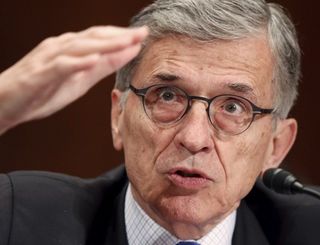FCC's Wheeler Still Plans September Set-Top Vote

The Hill hits on FCC chairman Tom Wheeler's set-top proposal plan—what is in it and the scheduled Sept. 29 vote—continued Friday at the end of a long week that saw some Democrats piling onto the proposal, or at least sending up lots of flares.
In a letter to Wheeler, 16 members of Congress from both parties—uniting Rep. Marsha Blackburn (R-Tenn.) and Rep. Judy Chu (D-Calif.), Lamar Smith (R-Texas) and Adam Schiff (D-Calif.), for examples—called on the FCC to postpone the vote. What they actually did was "suggest" Wheeler "reconsider [his] intent to force a vote."
Wheeler signaled in response that he was staying the course. "Chairman Wheeler is looking forward to working with his colleagues on this proposal and expects it to be voted at the September meeting," said FCC press secretary Kim Hart.
Like many stakeholders, the legislators say they are concerned with an app standards licensing body in the proposal, over which the FCC would have authority, at least to the extent of insuring that any licenses are not unreasonable or anticompetitive.
They said that while they supported the app-based approach, which the chairman pivoted toward after it was proposed by cable operators, they said the FCC variation on that app-based theme, which cable operators also have issues with, would be "proceeding in a way that abrogates the legitimate interests of copyright owners" and "will not achieve the desired result."
Wheeler has said he is willing to work with his colleagues to come up with a way to protect copyrights and still achieve the congressional mandate of competitive navigation devices and told a Senate panel this week they are "90% there."
The Copyright Office has issues with the FCC proposal, which the legislators cited in calling for the stand-down.
Broadcasting & Cable Newsletter
The smarter way to stay on top of broadcasting and cable industry. Sign up below
"As you know, the Copyright Office concluded that the original proposal could diminish the value of copyright-protected works by creating a 'new statutory license that requires the entirety of copyrighted programming offered by MVPDs to be delivered to third parties including for commercial exploitation' without congressional authorization."
They said they share those concerns, and, flexing a little legislative muscle, added that "only Congress can prescribe exceptions to the bundle of rights that a copyright owner possesses," i.e. a compulsory license exception.
Wheeler has said, and press secretary Kim Hart echoed Friday, that "nothing in Chairman Wheeler’s proposal would create a compulsory license."
"All of the programming will remain in the pay-TV app and will be distributed according to licensing agreements between programmers and pay-TV service providers," said Hart. "The only purpose of the licensing body is to develop a process third parties can follow to get the apps on their consumer devices."
Contributing editor John Eggerton has been an editor and/or writer on media regulation, legislation and policy for over four decades, including covering the FCC, FTC, Congress, the major media trade associations, and the federal courts. In addition to Multichannel News and Broadcasting + Cable, his work has appeared in Radio World, TV Technology, TV Fax, This Week in Consumer Electronics, Variety and the Encyclopedia Britannica.

